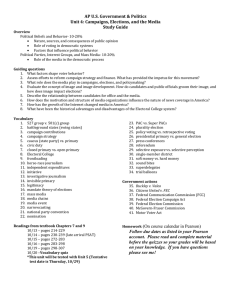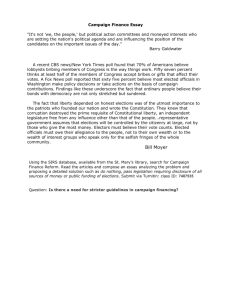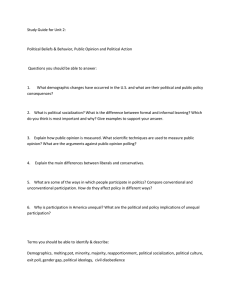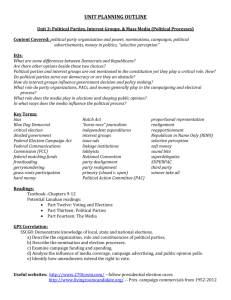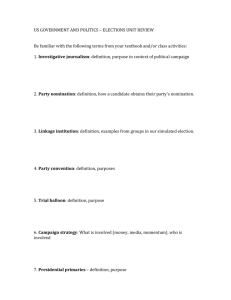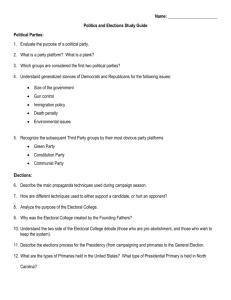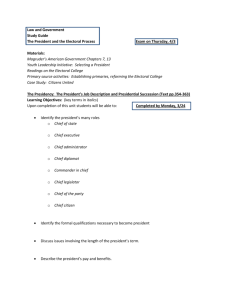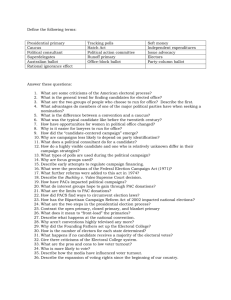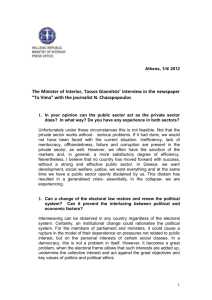Politics, Campaign Financing and Corruption By Ramon Casiple
advertisement
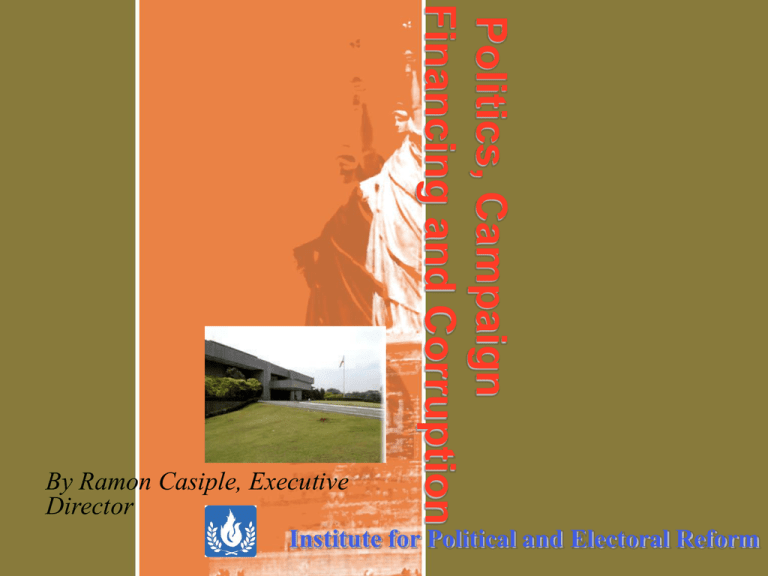
Politics, Campaign Financing and Corruption By Ramon Casiple, Executive Director Institute for Political and Electoral Reform Introduction I Philippines is 121st out of 161 countries surveyed in 2006 re corruption perception index. It was 106th in 2004 and 117th in 2005. It shares place with Nepal and Indonesia. (TI 2006) Introduction II • Corruption affects 70 percent of Philippine politics Introduction III • However, there is only 5-10 percent bribery experience for Philippine households in 2005. The Theory of Philippine Elections • Elections for the presidency, vice-presidency, and senatorial positions every six years (half of senate every three years) • Elections for representatives (single-district and party-list), and local officials (governors, provincial board members, mayors, councilors, barangay chairperson and council members) every three years • President/vice-president have only one term; senators are allowed two terms, and all others have three terms The Theory of Philippine Elections • The constitutionally-mandated Commission on Elections (Comelec) has both administrative and quasi-judicial functions regarding elections. • It can deputize practically the whole government for electoral duties and has regulatory powers over all election-related activities. • It has the authority to settle pre-proclamation cases, proclaim winners except the president and vice-president position, and postproclamation protests involving local officials Philippine Constitutional Democracy • Elective officials as either executives or legislators in a republican structure of government – Bicameral Congress, with Senate and House of Representatives – Executive department under the President, assisted by the Cabinet – Local government supervised by the President • Judiciary under the Supreme Court and constitutional commissions whose members are appointed by the President and confirmed by the bicameral Congressional Committee on Appointments Philippine Constitutional Democracy • Constitutional commissions handle the elections, audit, anti-corruption, and civil service components of government. A human rights commission is mandated by the Constitution • Non-governmental organizations are recognized under the constitution and the government is required to work with them, including electoral work. Campaign financing laws • 1987 Constitution – Mandates Comelec to regulate campaign spending – Ban foreign electoral contribution – Supervise use of government permits or franchises during elections • The intent here is to ensure equal opportunity in running for elective positions Campaign financing laws • Omnibus Election Code (1985) – Sets spending cap on election expenditures – Spell out prohibited contributions, especially from those with connection to government – Spell out legal categories of spending and donations – Laid out the rules and process for accepting donations, recording of contributions and expenditures, reporting, and penalties Campaign financing laws • RA 7166 (Synchronized Elections) – Sets the spending cap to PhP 10 (US$ .20) per voter for a presidential and vicepresidential candidate – Sets the spending cap to PhP 3 (US$ .06) per voter for all other candidates in respective constituencies – Sets the spending cap to PhP 5 (US$ .10) per voter for political parties in constituencies where they have official candidates Campaign financing laws • Major questions – Weak supervision of political parties – Unrealistic spending caps – No ceiling on campaign contributions – Weaknesses of the Comelec in audit and supervision of political parties and candidates – Light penalties for infractions or violations Reality of Philippine elections • Some income statistics (2003) – Average family income: PhP 148,616 (US$ 3,033) – Average family expenses: PhP 124,377 (US$ 2,538) – Per capita poverty threshold: PhP 12,309 (US$ 251), those below are 24.4% of all families – Nearly 80% have income below average The Tale of the Pocket in Elections Presidential Campaign: – PhP 2.5 billion-PhP 5 billion • Senatorial Campaign: – PhP 150 million-PhP 500 million • Congressional Campaign: – PhP 3 million-PhP 100 million • Governatorial Campaign – PhP 5 million-PhP 150 million • Mayoralty Campaign – PhP 1 million-PhP 100 million Reality of Philippine elections • Campaign funds come mainly from major candidates, self-raised funds, and financiers. • Party-raised funds are scarce due to very weak political party system. • Illegal sources such as illegal gambling lords, drug lords, bank robbery and kidnapping, and smugglers have entered the picture. Reality of Philippine elections • Patronage politics replaced party-based politics. • Personality-oriented electoral choice replaced platform-based choice. • Popularity and media projection have risen in importance. • Use of government resources by incumbents are widespread. • Electoral process becomes dishonest, and subject to undue pressures. Reality of Philippine elections • The other side – The party-list system has enabled small and genuine political parties to develop and enter Congress – Local contests have been won on the basis of strong organizations and active citizenry – Electoral reform movement now awakening more people towards participation in electoral watchdog and monitoring, advocacy for stronger electoral laws, and citizen-voter education Party/Campaign Finance Reforms • State supervision of political parties as public institutions • Strengthening party discipline and ban on turncoatism • State subsidy for political parties/candidates • Restrictions on campaign expenditures • Transparency and accountability in campaign finance reporting • Citizen-voter education The whole reform package • First, legislative acts for broadening the people’s participation in elections and governance, amending electoral laws, campaign financing reforms, and strengthening the political party system; • second, reform initiatives such as electoral modernization, citizen-voter education, revamping and reforming the election administration, and harnessing civil society for electoral duties; and • Third, constitutional reforms to depoliticize election administration and enable nonpartisan conduct of elections Conclusion • Money and politics in current Philippine elections have a symbiotic relationship. • The situation leads to a spiralling momentum downwards: – More corruption in the system, maldevelopment of the economy, and poverty for most of the people. – Vitiation of political will for reforms and for the people’s welfare. – When government is perceived to be only for a small economic and political elite, the seeds for social unrest is sown. – Vast majority is basically shut out of meaningful participation in the nation’s affairs through public service and leadership. A final word There is urgent need to break the vicious cycle of money politics and corruption. Only a comprehensive set of political and electoral reforms can do it. However, the people themselves will have to do it, not the traditional politicians.
